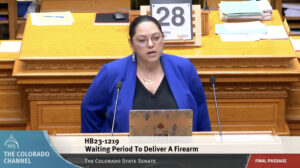Some five years ago, as Colorado’s red-hot economy was exacerbating labor shortages, some restaurant owners began actively recruiting from prisons, seeking departing inmates who they expected would need work and relish job opportunities.
Legislators in 2019 gave that suddenly attractive pool of potential workers more help, as they passed the “ban-the-box” bill that forbade most employers from asking on initial applications if jobseekers had a criminal record. Now, as employers still advertise roughly two open positions for each unemployed state resident, legislators want to go even further and offer those leaving incarceration and those having criminal records both financial and regulatory help in re-entering the workforce.
The Senate Judiciary Committee is scheduled to vote Wednesday on Senate Bill 12, which would create a pilot program to offer cash assistance to persons who were incarcerated and who enroll and participate in workforce services or training programs. And the House Business Affairs and Labor Committee is scheduled next week to debate House Bill 1004, which would bar state licensing boards from considering applicants’ nonviolent felony or misdemeanor histories more than three years after sentences end.
Will job training keep people from returning to jail?
Both bills rest on the premise that during a time of continuing skilled-labor shortfall, the state government can and should do more to help criminals who have served their time learn new skills or use the skills they already possess to contribute to society again. Previously incarcerated individuals often have a hard time finding jobs, and that inability to procure employment is a major factor in the 31% recidivism rate reported by the Colorado Department of Corrections.
However, the question looming over both bills is whether the proposed solutions are appropriate actions for the state to take and whether, especially in the case of SB 12, their potential returns justify their investment. The answers may determine whether the state’s expanding workforce-development efforts grow beyond students and adults seeking to upskill into a population of some 8,000 Coloradans leaving incarceration annually that is seeking rehabilitation as well as jobs.
“Cash assistance and workforce training allow you to gain confidence and earn a living, which go hand in hand,” said Demetrius Somerville, a fellow for the Center for Employment Opportunities, in testifying to the Senate Judiciary Committee on Jan. 29 for SB 12.

Colorado state Sen. James Coleman speaks on the Senate floor in January.
SB 12, sponsored by Democratic Sens. Julie Gonzales and James Coleman of Denver, would invest $15 million annually in a pilot program that would pay as much as $3,000 each to eligible participants to cover basic life expenses as they are leaving incarceration. Recipients would have to be enrolled in a workforce-training program offered by a re-entry service provider located in Colorado within six months of leaving a correctional facility, and the organization that is chosen to run the program must report annually on its success.
Clashing opinions over Senate Bill 12
Valerie Greenhagen — regional director for the Center for Employment Opportunities, which provides training and stipends to 300 people per year now — said her organization has placed 100 people into full-time jobs since July 1. They not only receive job training but job coaching, helping them reach self-sufficiency, she said.
But opponents of the idea include the Colorado Department of Corrections, which already spends $1.4 million aiding former prisoners as they leave incarceration and offers job-placement assistance. The proposed pilot program would duplicate existing services without clear indicators of how success would be measured, and the bill is written so narrowly that only one Colorado organization could qualify to run the program, director of policy and legislative affairs Adrienne Sanchez said.
Corey Gaines — a Logan County resident and junior college instructor who works with inmates from Sterling Correctional Facility — acknowledged that the current $100 stipend given to those exiting incarceration is minimal for their needs. But he questioned whether the significant increase in payments in this program would pay off — and asked what message it might send to individuals without criminal convictions who are struggling to get by but aren’t able to get such help from the state.
“I think $100 gate money is probably inadequate, but I think $3,000 is excessive,” Gaines told the Senate committee. “I question whether 30 times that money would have 30 times the effect.”
Potential licensing help for formerly incarcerated

Colorado Sen. Julie Gonzales speaks on the Senate floor during a debate in 2023.
Gonzales asked that SB 12 be laid over after the Jan. 29 hearing, suggesting that it would not have made it out of committee as originally written. She told members that she recognized the bill needed more work, making it likely that she and Coleman will attempt to amend it significantly before its scheduled vote on Wednesday afternoon.
HB 1004, sponsored by Democratic Reps. Jennifer Bacon of Denver and Shannon Bird of Westminster, doesn’t carry the same price tag; it anticipates generating $170,000 a year for the proposed new regulation requirements by raising occupational-licensing fees. But it would change how licensing boards consider applicants with criminal histories and, in doing so, seek to open the existing talent pool for a wide range of jobs to those people who now may be denied such jobs commonly because of their previous incarceration.
The bill lets the Department of Regulatory Agencies consider criminal offenses in licensing decisions in perpetuity only if applicants have committed criminal sexual acts, fraud or embezzlement, arson, aggravated assault or abuse, carjacking or manslaughter or murder. For all other offenses, state regulators may not consider any conviction more than three years past the date of conviction, end of incarceration or end of parole period, whichever comes later.
House Bill 1004 up for debate soon
HB 1004 also would allow applicants with a criminal record to petition regulators for a pre-application determination of whether their criminal record would disqualify them from a license. In answering them, regulators must advise petitioners of any potential remedies for disqualification, the bill explains.
Finally, the bill places the burden of proof for denial of any license application upon the state to show how the applicant’s criminal conviction ties directly to their potential performance in an occupation.
While some employers are likely to welcome the chance to hire reformed offenders, others may be leery that disallowing consideration of nonviolent offenses like theft when considering the individuals for licensing could create problems in a workplace.
HB 1004 is scheduled for a 1:30 p.m. hearing before the House business affairs committee on Feb. 15.
